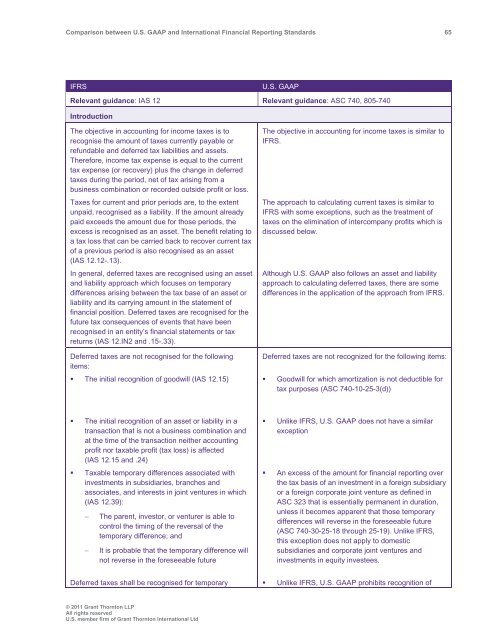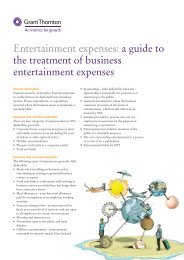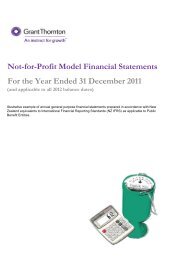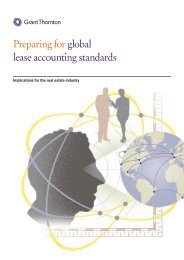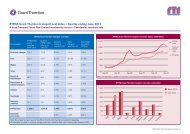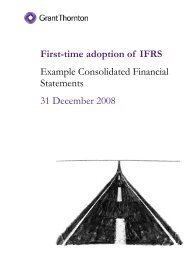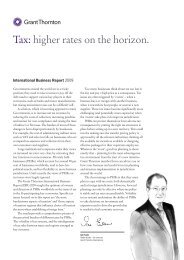Comparison between U.S. GAAP and International ... - Grant Thornton
Comparison between U.S. GAAP and International ... - Grant Thornton
Comparison between U.S. GAAP and International ... - Grant Thornton
Create successful ePaper yourself
Turn your PDF publications into a flip-book with our unique Google optimized e-Paper software.
<strong>Comparison</strong> <strong>between</strong> U.S. <strong>GAAP</strong> <strong>and</strong> <strong>International</strong> Financial Reporting St<strong>and</strong>ards 65<br />
IFRS<br />
U.S. <strong>GAAP</strong><br />
Relevant guidance: IAS 12 Relevant guidance: ASC 740, 805-740<br />
Introduction<br />
The objective in accounting for income taxes is to<br />
recognise the amount of taxes currently payable or<br />
refundable <strong>and</strong> deferred tax liabilities <strong>and</strong> assets.<br />
Therefore, income tax expense is equal to the current<br />
tax expense (or recovery) plus the change in deferred<br />
taxes during the period, net of tax arising from a<br />
business combination or recorded outside profit or loss.<br />
Taxes for current <strong>and</strong> prior periods are, to the extent<br />
unpaid, recognised as a liability. If the amount already<br />
paid exceeds the amount due for those periods, the<br />
excess is recognised as an asset. The benefit relating to<br />
a tax loss that can be carried back to recover current tax<br />
of a previous period is also recognised as an asset<br />
(IAS 12.12-.13).<br />
In general, deferred taxes are recognised using an asset<br />
<strong>and</strong> liability approach which focuses on temporary<br />
differences arising <strong>between</strong> the tax base of an asset or<br />
liability <strong>and</strong> its carrying amount in the statement of<br />
financial position. Deferred taxes are recognised for the<br />
future tax consequences of events that have been<br />
recognised in an entity’s financial statements or tax<br />
returns (IAS 12.IN2 <strong>and</strong> .15-.33).<br />
Deferred taxes are not recognised for the following<br />
items:<br />
• The initial recognition of goodwill (IAS 12.15)<br />
The objective in accounting for income taxes is similar to<br />
IFRS.<br />
The approach to calculating current taxes is similar to<br />
IFRS with some exceptions, such as the treatment of<br />
taxes on the elimination of intercompany profits which is<br />
discussed below.<br />
Although U.S. <strong>GAAP</strong> also follows an asset <strong>and</strong> liability<br />
approach to calculating deferred taxes, there are some<br />
differences in the application of the approach from IFRS.<br />
Deferred taxes are not recognized for the following items:<br />
• Goodwill for which amortization is not deductible for<br />
tax purposes (ASC 740-10-25-3(d))<br />
• The initial recognition of an asset or liability in a<br />
transaction that is not a business combination <strong>and</strong><br />
at the time of the transaction neither accounting<br />
profit nor taxable profit (tax loss) is affected<br />
(IAS 12.15 <strong>and</strong> .24)<br />
• Taxable temporary differences associated with<br />
investments in subsidiaries, branches <strong>and</strong><br />
associates, <strong>and</strong> interests in joint ventures in which<br />
(IAS 12.39):<br />
<br />
<br />
The parent, investor, or venturer is able to<br />
control the timing of the reversal of the<br />
temporary difference; <strong>and</strong><br />
It is probable that the temporary difference will<br />
not reverse in the foreseeable future<br />
• Unlike IFRS, U.S. <strong>GAAP</strong> does not have a similar<br />
exception<br />
• An excess of the amount for financial reporting over<br />
the tax basis of an investment in a foreign subsidiary<br />
or a foreign corporate joint venture as defined in<br />
ASC 323 that is essentially permanent in duration,<br />
unless it becomes apparent that those temporary<br />
differences will reverse in the foreseeable future<br />
(ASC 740-30-25-18 through 25-19). Unlike IFRS,<br />
this exception does not apply to domestic<br />
subsidiaries <strong>and</strong> corporate joint ventures <strong>and</strong><br />
investments in equity investees.<br />
Deferred taxes shall be recognised for temporary<br />
• Unlike IFRS, U.S. <strong>GAAP</strong> prohibits recognition of<br />
© 2011 <strong>Grant</strong> <strong>Thornton</strong> LLP<br />
All rights reserved<br />
U.S. member firm of <strong>Grant</strong> <strong>Thornton</strong> <strong>International</strong> Ltd


